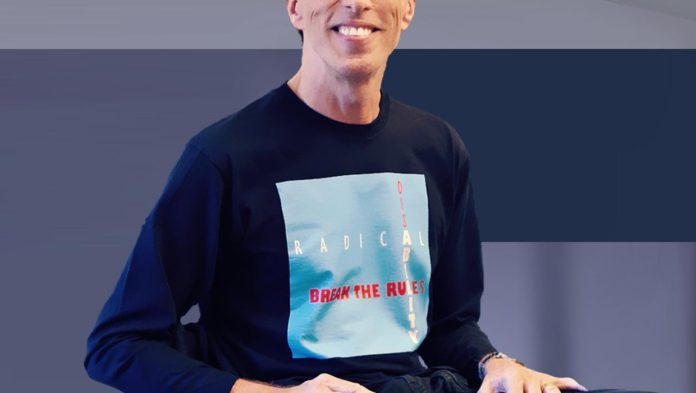Peter 2.0
(by Peter Scott-Morgan, Michael Joseph, €21, paperback)
Recalling the day he persuaded his partner to walk with him down the aisle, Peter Scott-Morgan says that the clincher was when he told him what music he had planned for their reception.
His partner Francis had been reluctant to take part in a public civil partner ceremony. “I played him Michael Ball singing ‘Love Changes Everything’.”
That decided it for them both. “Now that is something I could walk up the aisle to, with you by my side!”
Peter 2.0 declares itself to be a book about one man’s self-transformation into a cyborg – but in reality it is about much more: the life-changing dread wrought by diagnosis with a terminal disease; the hurtful words of pessimistic doctors; the uncertain promises of technology; and love, the power of human relationships to continue and persevere.
In this story of fierce determination, which aired as a documentary on Channel 4 last year, Scott-Morgan recounts key moments in his life since 2017, when he was diagnosed with ALS, a particularly vicious type of motor neurone disease, or MND.
It began with a gammy leg, which quivered strangely as he dried himself after a bath while on holiday in a location “far north of the Arctic Circle”.
After months of tests, he finally learned that he had possibly just two years to live.
His descriptions of medical personnel are spot on. One neurologist “was giving away nothing. I recognised this for what it was: the habitual façade of someone who often has to break bad news.”
Scott-Morgan earned a PhD in robotics from Imperial College London before embarking on a career in management consulting, and Peter 2.0 is far from his first book.
His eight other publications include The Robotics Revolution (1984) and The Unwritten Rules of the Game (1994) — in which he outlined the complicity and unspoken agreements that determine how things work in many industries, such as banking.
This subversive intelligence is what pushes him to take a novel approach to his illness. People with MND usually die of starvation, he says, because they can no longer swallow food, or asphyxiation, because they cannot breathe.
Yet the digestive tract keeps working, and their lungs still function, albeit weakly.
“The causes of death were not really medical issues — they were more like engineering issues,” he explains.
So begins his astonishing quest to identify technologies to replace the parts of his body that would soon break down (not to find a cure — that prospect is “almost certainly distant”), to become part-man, part-machine — in short, a cyborg, Peter 2.0.
He taps into the brainpower of top technology companies, including one that worked with Stephen Hawking, and railroads over the scepticism of some of his doctors.
His energetic attitude does not eclipse the dark moments he also endured.
One night, soon after his diagnosis, at 3.05am, “Without warning, what felt like a night terror attacked,” he writes. “Followed by another. Until they overwhelmed me. You’re going to die!”
One of the things that make the book work as a memoir is the fact that it doesn’t focus entirely on MND. Instead, Scott-Morgan dwells on the moment when, as a teenager, he learned not that he was gay – but that his sexuality was viewed by those around him as an abomination.
He grew up firmly embedded in the establishment, a brilliant young student.
A drama star, fencing champion and popular figure destined to become head boy, he took his privilege for granted.
That all changed when teachers heard rumours about his sexuality.
From that point on, he was forbidden to do theatre, lost any prospect of a leadership role at the school, and was advised by a teacher to be “a little less flamboyant”. He was also violently caned, along with another boy.
These events scarred Scott-Morgan for life, but they also helped to shape his philosophy.
He and Francis were the first gay couple in the UK to be legally joined in a civil partnership, and they organised a highly public ceremony designed to challenge religious figures who were speaking out against it.
“Our decades-old mantra ‘The Scott-Morgans don’t give in to bullies’ took hold,” he writes.
The same backdrop holds true for his approach to disability. He and Francis were troubled to realise the financial struggles which disabled people face, their struggles to get just special parking, and the interminable forms to fill in to obtain support.
When he encounters apathy in the medical community, he changes course and finds another doctor. He sets up a foundation with the goal of helping people with extreme disability not just to survive, but to thrive.
The worst thing about MND, he suggests, is “the attitudes that surround it”.
Peter 2.0 is a provocative, often funny and deeply humane account of a patient who takes control of his fate and runs with it gleefully, aiming to change the world’s approach to MND.
Although Scott-Morgan’s future is distressingly precarious, some things are certain, including one of his crucial rules for living. “Love – eventually – conquers all.”
Sunday Independent Supplement








